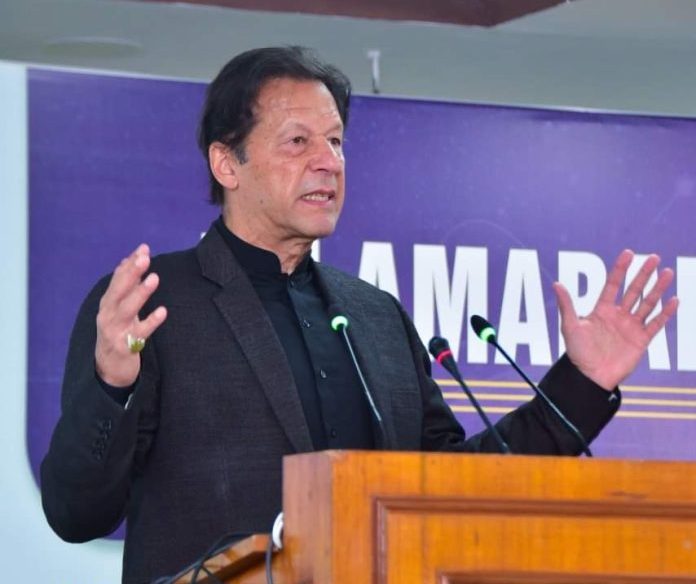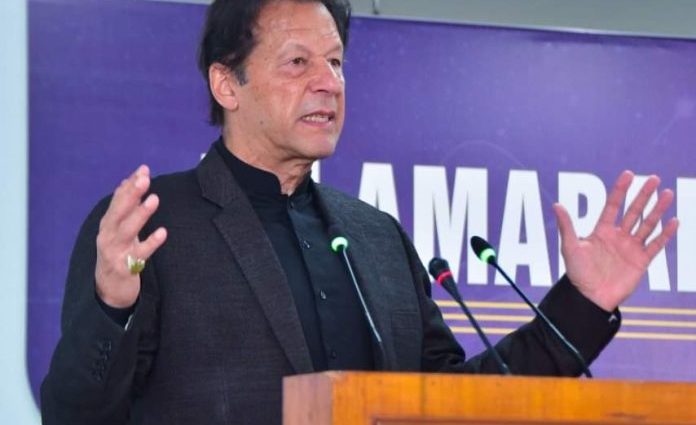PM urges int’l community to help avert looming humanitarian crisis in Afghanistan
peace in Afghanistan was not only vital for the future of Pakistan but also for the Central Asian
Pakistan made efforts for the resumption of dialogue to resolve the outstanding disputes in a peaceful manner, but they took it as Pakistan’s weakness.
Pakistan would do every effort to help address the sufferings of the 40 million Afghan people, he said, while addressing the inaugural session of the Islamabad Conclave on “Peace and Prosperity in South Asia” here at the Institute of Strategic Studies.

Pakistan is to host an extraordinary meeting of the OIC Council of Foreign Minister in Islamabad on December 19, to deliberate on the humanitarian situation in Afghanistan and to find a way out to address the sufferings of the Afghan people. Prime Minister said Pakistan through the OIC would play its part to reach out to the Afghan people who were in dire need of food, shelter and medicines.
Prime Minister Imran Khan mentioned the freezing of Afghanistan foreign exchange reserves by the United States as one of the major factors behind the economic and humanitarian crisis for Afghans, who were facing problems for the last 40 years.
He said that due to the humanitarian crisis in Afghanistan, Iran was also facing the problem of refugees.
The Prime Minister said that peace in Afghanistan was not only vital for the future of Pakistan but also for the Central Asian States which were much interested in regional trade and connectivity. Imran Khan in his address spoke on various issues of regional and international interests including Pakistan-India relations, Jammu and Kashmir dispute, climate change, etc.
Prime Minister Imran Khan while highlighting the importance of resolving the Jammu and Kashmir dispute for peace and prosperity of region said that the Kashmir dispute had made the whole of South Asia hostage.
Imran Khan recalled that soon after coming into power he contacted the Indian Prime Minister Narendra Modi and made efforts for the resumption of dialogue to resolve the outstanding disputes in a peaceful manner, but they took it as Pakistan’s weakness.
The Prime Minister said he had a considered opinion that the disputes like Jammu and Kashmir could only be resolved through dialogue and not through “bomb and guns”.
If the issues could be resolved through the bomb and guns, then the United States, which was a big military power, should have won in Afghanistan, he remarked.
The Prime Minister said it was unfortunate not only for the Kashmiris alone but also for the 500 million minorities living in India that Modi-led regime with an ideology of RSS-Hindutva and supremacy of upper class Hindus was in power.
He maintained that India cannot achieve peace and development by marginalizing the 500 million minorities.
The Prime Minister said that Pakistan wished and prayed for a government in India with which it could talk with logic and argument for the just resolution of Jammu and Kashmir dispute through dialogue.
Prime Minister Imran Khan talking about the challenges of climate change faced by the whole world including South Asia said that the fast melting Himalyan and Karakorum glaciers in the region were posing serious climatic problems for Pakistan, India and other regional countries.
He highlighted the importance of regional cooperation including between India and Pakistan to tackle the challenges of climate change by saying that since the two countries share borders, measures taken by one country alone cannot address the problem effectively.
The Prime Minister further said that with Pakistan getting water from Karakorum and Suleman ranges, Himalyia was the big source of water for India, which should take steps to protect the natural source for future generations.
PM mentioning the business interests of India, which was using coal as a major fuel to generate power, he however, stressed that other sources of power-generation should be utilized to protect the region from climate change affects.
The Prime Minister said despite the fact that Pakistan was among the low-emission countries, it was taking several measures on climate change, which were being recognized and appreciated worldwide.
About international politics vis a vis South Asia, Imran Khan referred to the emerging blocks and the cold-war and maintained that Pakistan will not become part of any block and cold-war and will rather play a role to bring the countries closer.
He in that regard also mentioned Pakistan’s positive role for bringing closer the United States and China in the past and then also mediating between Saudi Arabia and Iran.
The Prime Minister praised the role of Institute of Strategic Studies in hosting and organizing important events and said Pakistan really needed such think-tanks to develop national narratives on various important issues through discussion and input from the scholars from across the world.

He regretted that some think-tanks in the US and West, without having the knowledge of and on-ground realities about important issues like religion and extremism, build opinions and gave their views about Pakistan.
The Prime Minister mentioned his decision about the establishment of Rehmatul-lil-Alameen Authority and said it was aimed at gathering religious scholars from across the world at one platform and build a true narrative and image of Islam for the world.
Earlier, Foreign Minister Makhdoom Shah Mahmood Qureshi in his remarks on the occasion presented Pakistan’s position on various issues of regional and international interest including the situation in Afghanistan.
He also mentioned the emerging humanitarian crisis in Afghanistan and called for international efforts including through the platform of the Organization of Islamic Cooperation (OIC) to help and assist the Afghan people in this hour of need.

About the situation in South Asia, the Foreign Minister said that Jammu and Kashmir was one of the oldest disputes on the United Nations agenda that still awaited resolution according to the wishes of the brave people of Kashmir.
The dispute can conflagrate into a nuclear flashpoint to the detriment of regional and global security, he warned.
The Foreign Minister said that the region has also been witnessing border stand-off between China and India, border dispute between Nepal and India, and water dispute between Bangladesh and India.
“Sri Lanka has endured 25 years of the bloodiest insurgency in its history. Afghanistan has lived through four decades of conflict,” he mentioned.
The Foreign Minister said there was a need to put human security at the center of national security strategies: a departure from security-centric polices to move the region towards development and prosperity. “This is the real challenge that South Asia faces today,” he remarked.
The Foreign Minister said that Pakistan has shifted its focus to geo-economics, adding, connectivity was the new buzz word, which can provide them enormous opportunities for national and regional development.
Describing regional cooperation as a must for South Asia to prosper, he said that the South Asian Association of Regional Cooperation (SAARC) needed to be revitalized by freeing it from narrow political agendas.
“Unfortunately, intra-regional trade remains low and concrete progress is required to overcome trade barriers, infrastructural deficits, and connectivity constraints,” he added.
The Foreign Minister said that Pakistan has decided not to be a part of any global or regional conflict, and has chosen to be a partner only in peace and development. “Pakistan is calling for inclusive and cooperative approaches based on enhanced economic partnerships,” he added.
He said that Pakistan will remain committed to peaceful co-existence, cooperative multilateralism, and consensus-driven outcomes. “We will always support an inclusive global order, for advancing the shared objectives of peace, progress and prosperity in the region and beyond,” he added.
The Foreign Minister said as they were living in an age of narratives, forming and disseminating narratives of Pakistan was a national responsibility.
“To bridge the gap between policy-makers and academics and present consensus-driven narratives, forums such as Islamabad Conclave can play an important role,” he maintained.

